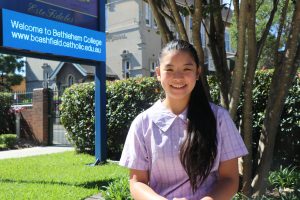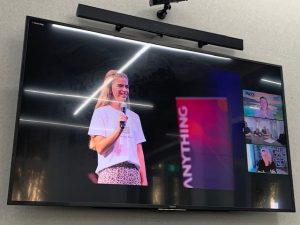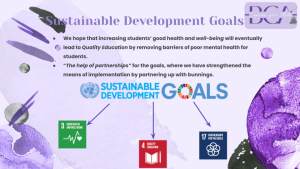"Express Your Mess!" Normalising Mental Health and Wellbeing at School
“To me, being a Global Citizen is someone who is aware of and understands the larger community. I also feel that it is someone who has an active role in the community, working with others to make our planet more peaceful, sustainable and equitable.”
Lucia, 2022 Global Citizenship Ambassador
Bethlehem College, Ashfield, is a secondary girls school situated in the inner west suburb of Sydney, NSW. They describe their purpose as aiming to empower students to become independent, creative thinkers and confident young women ready to take their place in the world. The Meg Languages Going Global Global Citizenship Student Ambassador Program supported these aims and was well-aligned to Sydney Catholic Schools’ Global Capabilities Initiative, supporting students to develop Global Capabilities beyond their school subjects in a real-world context.
The students aptly named their project, Express Your Mess, and through working with their school and local community, implemented effective solutions for the project aims of normalising mental health and student stress.
Project outcomes:
- Establishment of a safe ‘time out’ space for students to choose to go to when needed for their own mental health.
- Programming of mindfulness activities for students that were well attended. e.g. rock painting,
Bethlehem College commenced learning Chinese with the Meg Languages Program in 2022 and were then introduced to the Global Citizenship Student Ambassadors Program. They decided to participate in the program as they had a newly implemented course in the school, led by the Leader of Global Capabilities and Entrepreneurship, with the main focus of developing Global Capabilities within students. They realised the Global Citizenship Student Ambassadors Program would meet some of the key needs of this initiative and help students develop those skills.
“We decided to take part in the Student Ambassador Program because we had a newly implemented program and course in the school, led by the Leader of Global Capabilities and Entrepreneurship… with the main focus of developing global capabilities within students. Looking at the Global Ambassadors program we realised that that would really meet some of those key needs and help students develop those skills.”
Clara Hall, Leader of Global Capabilities and Entrepreneurship


Proud Ambassadors for their school, the students were excited to be able to not only design a solution to a real local issue they saw and cared about, but to actually implement it and see the benefits first hand.
Project description
The Ambassadors understood that, while they had a sense that mental health would be a welcomed topic to address for their peers, the first step in their process was to gain a better understanding of the mental health challenges their peers faced. They knew this was key to ensuring their solutions were relevant and focussed on their peers’ real needs.
They chose to use whole school data from the Tell Them From Me Survey, a NSW Education Department tool that measures student engagement and wellbeing, across years 7-12 and implemented at Bethlehem College in late 2022. The findings included:
- Moderate/high levels of anxiety = 41%, whereas normal is 23%
- Feel safe at school = 47%, whereas normal is 66%
The Student Ambassadors aimed to normalise mental health and help students to understand that mental health involves emotional, psychological, and social wellbeing. They wanted to make a positive impact on wellbeing and mental health at Bethlehem College. They broke this broad area into two key topics to address:
- High levels of anxiety and stress
- Negative perceptions of mental health needs
They then identified two immediate solutions to address these areas:
- Establishing a wellbeing room: This needed to be a central location with easy access for all students. It needed to feel like a safe space for students to ‘step outside’ any pressure they felt from school academic life. It would also be a place of relaxation during assessment periods.
- Introduction of a mindfulness activity: Held on a lunchtime so all students could take part, the activity (rock painting) aimed to be therapeutic for students who wanted to clear their minds. Rocks, once painted, would be displayed around the well-being room, displaying students’ artwork and positive messaging painted on the rocks.
As part of the knowledge exploration on topics linked to Global Citizenship Education, the students learnt about the UN Sustainable Development Goals and identified the following goals linking to their own project:
- 3: Good Health and Well-Being: Addressing mental health issues, supports students to be healthy and happy at school.
- 4: Quality Education: By supporting students’ mental health needs, students will be able to engage with their education, with positive mindsets.
- 17. Partnerships for the Goals: By partnering with students, parents, specialist staff, and wider community businesses, such as Bunnings, the project became more inclusive and was amplified to impact more people.
“I didn’t know the amount of power and impact a Global Citizen can have! They can take one little action and that can be improved on and spread to different parts of the world and make change like that. It’s pretty impressive the amount of impact it could have. I learnt about the amount of power a Global Citizen has.”
Emma, 2022 Global Citizenship Student Ambassador
Inclusive solution design
As part of the Global Citizenship Ambassador program, students explored the concepts of Diversity, Equity, and Inclusion (DEI) and embedded these concepts into their project solutions. They ensured that both the established safe space and the mindfulness activity of rock painting were accessible to all students, thus implementing solutions that they had considered for inclusiveness. For the project’s next stage (a guest speaker series on Mental Health) they planned to reach out to a broad range of diverse speakers who could share their own stories and experiences, including those of Indigenous people.

Students were inspired by a number of guest speaking experts working in the entrepreneur and changemaking space, including Future Anything’s Founder, Nicole Dyson.
Project Implementation
Informing and educating others
To effectively address their issue, they knew they needed to work with a number of parties with and beyond the school.
The Ambassadors took the initiative to reach out to key stakeholders within the school; the two school counsellors and Leader of Wellbeing. They then contacted school leadership and staff to create an awareness of the campaign, build program support and educate staff, so they could in turn, educate students about both the creation of the space, the mindfulness activities and the aims behind these actions.
They then needed to lobby school leadership to gain access to a dedicated space and successfully secured a suitable classroom for their Wellbeing Room. They did this by meeting with Ms Ann Freeman, the Principal of Bethlehem College, and preparing a persuasive pitch presentation for the need of

a dedicated space. Ms Freeman agreed to prioritise this issue and allocated a classroom for their use.
Next they focussed on communication with their school community. They placed a piece in the school newsletter and on the school social media channels (Instagram, Facebook and Twitter) informing the school community about the project and requesting donations. They also shared at year level meetings and in homeroom circle meetings.
They aimed to reach beyond their school community, to the wider community, and successfully reached out to Bunnings requesting donations of materials needed for the rock painting activities, through accessing their help form and then continuing communication with the staff via emails.
Implementing, iterating and improving
“We were particularly interested in students engaging with people from outside of the school, in the local and global community, and we really wanted students to focus on developing skills in communication, problem solving and the role of a Global Citizen and how small change can have big impacts. They might think they are just a student in a school, but they can have far-reaching impacts with their projects.”
Clara Hall, Leader of Global Capabilities and Entrepreneurship
At the initial project planning stage, the Ambassadors planned a project with several solutions, however, through its implementation, the original project outline was simplified as the Ambassadors juggled their academic requirements and maintained the project’s momentum. Through this experience the Ambassadors learnt how to project manage a real-world project, with dynamic schedules and competing priorities across the team. They were resourceful in looking to and using readily available resources around them and worked as a team to successfully secure the needed resources to achieve the project aims.
The original project aims had included reaching out to the school’s internal Wildflower blog, which also had a podcast and an Instagram page. This was re-designed as a ‘next stage’ for 2023 after the Ambassadors realised they needed to first implement the core aims of establishing the mental health space and program mindfulness activities with the resources and time that they had currently available.
As the year progressed, the Ambassadors faced a number of setbacks such as not raising their target amount of money needed for project resources in their initial fundraiser event, however, this forced them to be resourceful and persevere. These setbacks also required them to then look further beyond the school, to community businesses and organisations, such as Bunnings, for donations, leading to the successful securement of activity equipment donations. This provided great experience for the Ambassadors on setting up community partnerships, linking back to UN Sustainable Development Goal 17: Partnerships for the Goals.
The Ambassadors addressed and solved a number of real-life challenges throughout the year using a range of skills including creativity, problem-solving, and critical thinking skills, so the project could continue as planned and achieve its original aims.
Project Outcomes
“It has definitely raised awareness of mental health at Bethlehem College… seeing their peers implement a project that was to help everyone and that was open to everyone. We had a large number of students come to the first rock painting session and it far exceeded the expectations of the girls… There were so many girls involved.”
Clara Hall, Global Capabilities and Entrepreneurship Lead Teacher
The students and educators at Bethlehem College benefited by seeing the Ambassadors modelling Students as Changemakers with a real-life project and observed the impact and success they had, as active and engaged Global Citizens. The Ambassadors experienced successful Student Voice and Agency, with clear success for not only the Student Ambassadors, but for all impacted by the project’s successes.
Skills Developed
The Ambassadors developed a range of leadership skills alongside the ideas and skills of Changemaking, with at least one of the Ambassadors planning on using these skills for a separate project they are passionate about.
The Ambassadors needed to use a wide range of skills in both the project design and the implementation phases. Their accompanying educator, Clara Hall, observed and identified their use of Global Capabilities and growth in the following skills:
- Communication – with students, staff and wider school community
- Entrepreneurial skills
- Problem-Solving
- Community Involvement
- Teamwork and Collaboration
- Communication
- Project-planning and implementation
- Change in thinking and practices to those already in place at school
- Leadership skills
“I feel like I’ve learnt new skills, how to connect with the wider community…. More like social skills and presentational skills.
Lucia, 2022 Global Citizenship Student Ambassador
Project alignment to school and state curriculum
Meg’s Global Citizenship Student Ambassador Program is well-aligned with the Sydney Catholic Schools Global Capabilities Initiative, covering all six of it’s Global Capabilities:
- Communication;
- Collaboration;
- Critical thinking;
- Creating new value;
- Confident learner; and
- Cultural capability.
2023 and beyond – next steps
The Student Ambassadors have identified several ‘next steps’:
- Continue fundraising for furniture and resources for the Wellbeing space.
- Establish and hold regular sessions of rock painting for girls in year 7 and beyond
- Reach out to more external organisations including the local council and spread awareness of their plight.
The Student Ambassadors’ aims for the project in 2022 was to introduce the program into their school and then to build on the program with further mental health and mindfulness activities programmed for 2023. They also wanted to build further relationships with the wider community, with a guest speaker series at school assemblies, and also with the school’s existing blog, ‘Wildflower’.
We can’t wait to see where they take the project next!
“I’m just so happy we finally got to implement change and be ambassadors for a positive change.”
Emma, 2022 Global Citizenship Student Ambassador
Share this post


